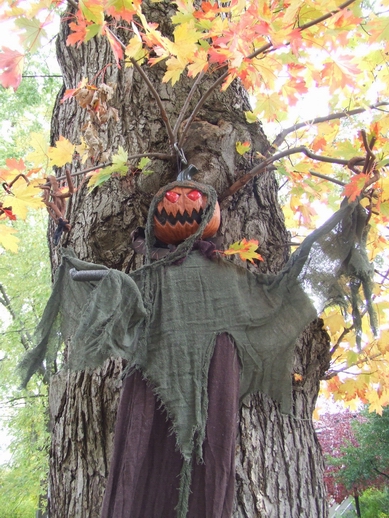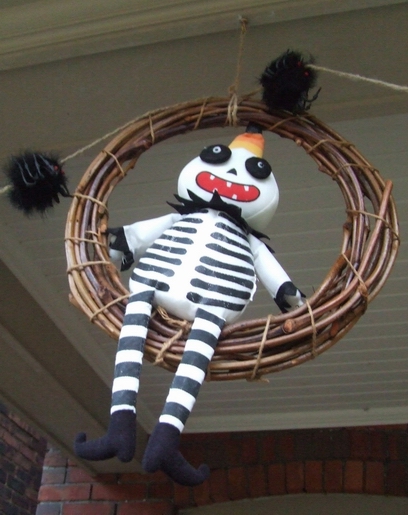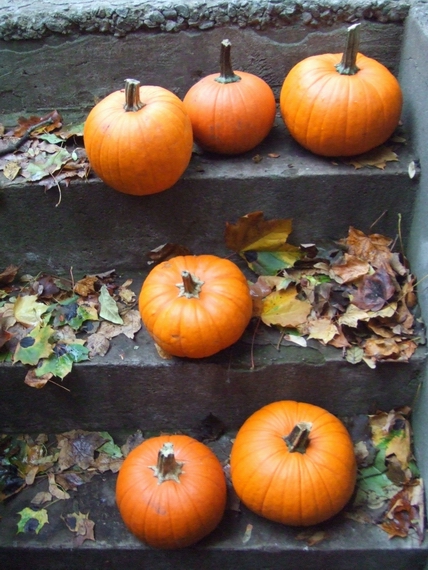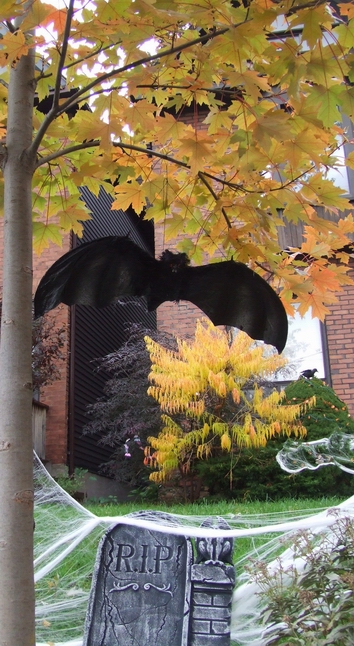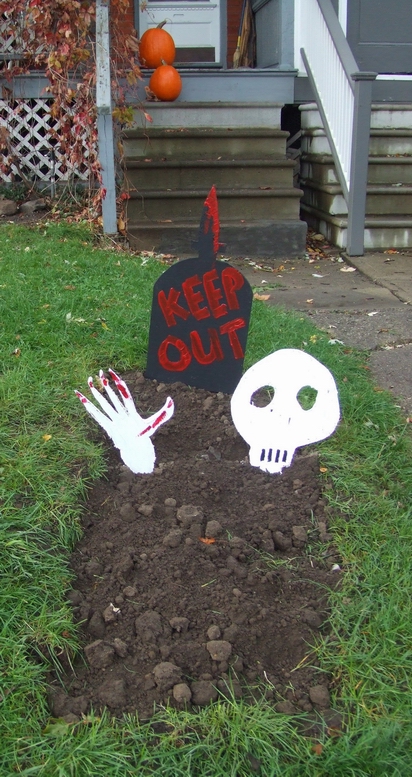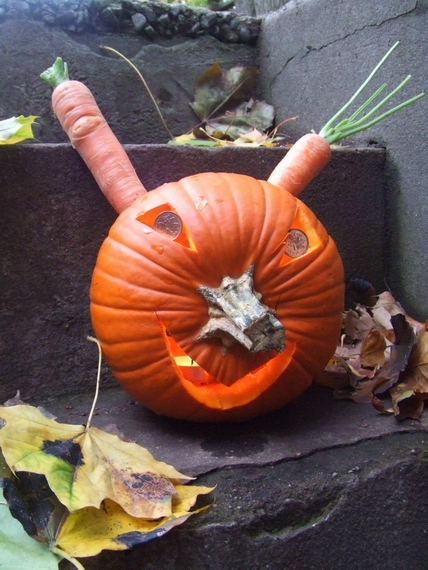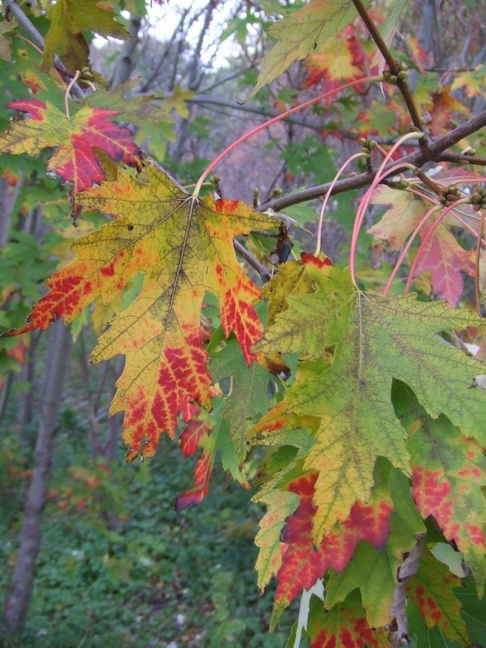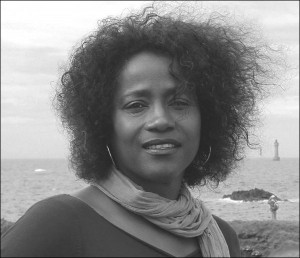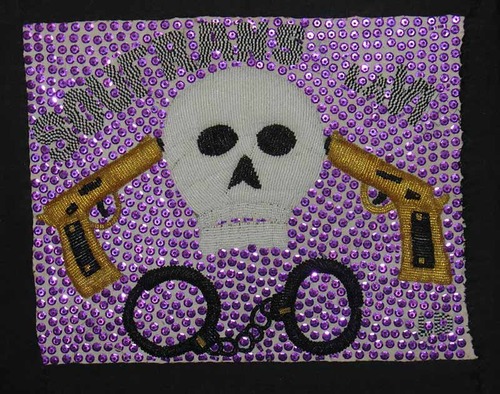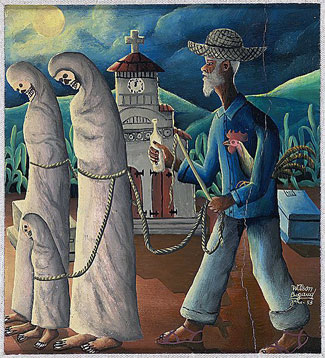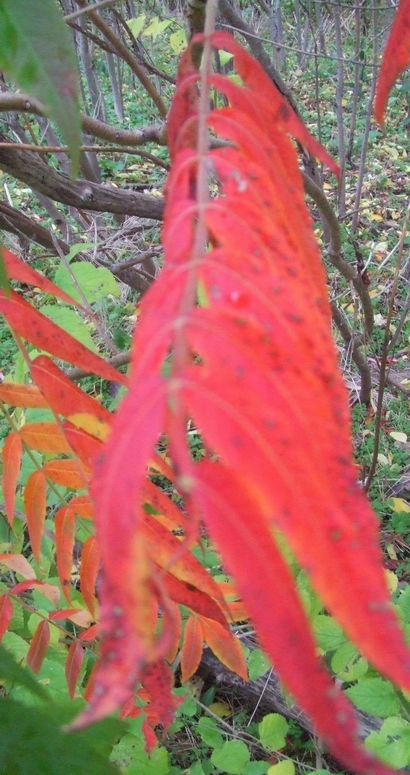Hallowe’en: a-haunting in the ‘hood / El día de la Víspera de Todos los Santos: appariciones en el barrio
Posted: October 31, 2011 Filed under: IMAGES Comments Off on Hallowe’en: a-haunting in the ‘hood / El día de la Víspera de Todos los Santos: appariciones en el barrio
Macumba Words: Aimé Césaire
Posted: October 26, 2011 Filed under: Aimé Césaire, English, French, ZP Translator: Alexander Best | Tags: Black poets Comments Off on Macumba Words: Aimé Césaire ZP_Aimé Césaire dans les années 1930
ZP_Aimé Césaire dans les années 1930
Macumba-Word
.
A word can be father to a saint,
words are the mothers of saints,
with a word that both chases and caresses one can
cross a river peopled by caïmans.
Sometimes I sketch a word on the sun,
with a cool, fresh word one spans a desert
in a day.
There are life-buoy words that ward off squalls,
there are iguana-words,
there are delicate words – phantom stick-insect words.
And those shadow-words
when one awakes in a rage of flying sparks.
There are Shango words.
And sometimes I swim slyly – playfully –
upon the back of a dolphin-word.
. . .
Glossary:
Macumba – an African (Bantu) word generally meaning “magic”
caïmans – a species of crocodile found in the Caribbean, Central and
South America; hunts along riverbanks
Shango – god of fire, thunder and lightning, from West-African religion
– mainly Yoruba; survived “The Middle Passage”, and is venerated in
Haitian vodou (voodoo) and Brazilian candomblé.
dolphin – perhaps a reference to two ‘dolphins’:
‘dauphin’ as in ‘Dauphin’, the old heir-apparent to France’s throne +
the notion of “correct” French;
also the Boto (Amazon River dolphin) of Afro-Brazilian religion
. . . . .
Mot-Macumba
.
Le mot est père des saints
le mot est mère des saints
avec le mot couresse on peut traverser un fleuve
peuplé de caïmans
Il m’arrive de dessiner un mot sur le sol
avec un mot frais on peut traverser le désert
d’une journée
Il y a des mots bâton-de-nage pour écarter les squales
il y a des mots iguanes
il y a des mots subtils ce sont des mots phasmes
il y a des mots d’ombre avec des réveils en colère
d’étincelles
Il y a des mots Shango
Il m’arrive de nager de ruse sur le dos d’un mot dauphin.
. . .
Aimé Césaire (1913-2008) was born and died in Martinique,
yet he was a man of the world. In his poetry and plays, both
full of hope and strength, he promoted decolonization
throughout the island-countries of the Caribbean. From
the geography and customs of those same islands he
drew much of his imagery – as in the poem featured above.
English translation: Alexander Best.
*
Aimé Césaire (1913-2008) était un Martiniquais, aussi
un homme du monde. Dans sa poésie et son théâtre, et avec
de l’espérance et puissance, il a promis la décolonisation des
pays caraïbes. Ses paroles sont fondées sur la géographie et
les coutumes de ces mêmes îles. Par exemple: le poème ici…
Traduction en anglais: Alexander Best
Kettly Mars: Defiance of Oblivion
Posted: October 26, 2011 Filed under: English, French, Kettly Mars, ZP Translator: Alexander Best | Tags: Black poets Comments Off on Kettly Mars: Defiance of OblivionBehind the door
.
Sweet sentinel, you keep watch
over the shadows of my room.
This evening my dreams depart
for the north. Toward the sea.
Gentle candle, gentle
flame, under your tears of light
wood, stone, copper and glass
cloaked in golden silence
bathed in the same mystery.
. . .
Derrière la porte
.
Douce sentinelle, tu veilles
sur les ombres de la chambre.
Ce soir mes rêves partent
vers le nord. Vers la mer.
Douce bougie, douce
flamme, sous tes larmes de lumière
bois, pierre, cuivre et verre
enveloppés d’or silencieux
baignent dans le même mystère.
. . .
My hand and the stone
.
My hand and the stone,
sage rebellion of noble particles
gripped in my palm.
I’ve made my own her reality:
grey, heavy, oval.
Millenial stone
whose cry
lays claim to nothing other than a
defiance of oblivion.
. . .
Ma main et la pierre
.
Ma main et la pierre,
sage rébellion de particules
tenant dans ma paume.
J’ai fait mienne sa réalité
grise, lourde et ovale.
Pierre millénaire
jusqu’en son cri
elle ne se prétend autre chose
qu’un défi à l’oubli.
. . . . .
Kettly Mars est née en 1958.
Un romancier à le proue de la littérature haïtienne,
elle est aussi un poète. Les poèmes ici viennent de
son recueil de 2011, Feulements et sanglots.
Traductions: Alexander Best
*
Kettly Mars, born in 1958, is a novelist
at the forefront of Haitian literature.
She is a poet as well, and these poems
are from her 2011 collection, Growls and Sobs.
Translations into English: Alexander Best
Haitian Creole: Five Poets
Posted: October 22, 2011 Filed under: Creole / Kréyòl | Tags: Black poets Comments Off on Haitian Creole: Five PoetsAlexander Akao (Aleksann Akao)
Zombies Arise
Since I was a kid they’ve been choking me
They grab me, they stuff me into a barrel
Too small for me
They stuff me into a dart-gun
They squash me like a mango
They squash me like a banana
They refuse to let me open my mouth
To speak my mind
“You got nothing to say, you’re a kid !”
But when I’m walking I’m looking around
I see everyone at my side
Is in the same fix as me
They’re burying us all alive
They’re stuffing us in the earth
Like slaves locked up in a canefield
When it’s not a horsewhip, papa,
Making us walk a straight line
It’s a tonton macoute* gun
That gestapoes or SDs ** us
But this morning I wake up
With salt on my tongue
Nothing’s gonna stop me from speaking out !
(1980)
* tonton macoute – paramilitary force,
including Duvalier bodyguards, involved in
organized crime; terrorized the Haitian
people, committing many human-rights abuses
** SD – Service d’Information:
Haiti president/dictator Jean-Claude Duvalier’s secret police
_____
Zonbi Leve
Depi m’piti y’ape toufe mwen
Yo pran-m, yo foure-m nan yon barik
Ki twò piti pou mwen
Yo foure-m nan sabakann
Yo toufe-m tankou mango
Yo toufe-m tankou bannann
Yo refize kite-m ouvri bouch mwen
Pou m’eksprime sa mwen panse
“Ou pa gen lapawòl, se timoun ou ye”
Men lè m’mache m’al gade
Mwen wè se tout moun ki sou kote-m
Ki nan menm eta sa-a avè-m
Yo antere-n tou vivan
Yo toufe-n nan tè-a
Tankou esklav te fèmen nan jaden kann
Lè se pa rigwaz papa
Pou fè-m mache SS
Se fizi tonton makout
K’ap gestapo, k’ap SD nou
Men maten-an mwen leve
Ak sèl sou lang mwen
Pa gen anyen ki ka anpeche-m pale !
(1980)
Suze Baron (Siz Bawon)
They say
They say
human blood
enriches the soil
If it were so
if it were so
my friends
rice millet and corn
would be plenty
in Haiti.
_____
Yo di
Yo di
san kretyen
enrichi
latè
Si sete vre
Si sete vre
mezanmi
ala diri
pitimi
ak mayi
ki ta genyen
lan peyi
d’ Ayiti.
_____
Georges Castera (Jòj Kastra), born 1936
Blood
Let’s go see blood flow,
darling.
For once in a lifetime,
it’s not people’s blood spilling,
for once in the street
it’s not animal’s blood flowing,
let’s go see blood flow,
darling:
the sun is setting.
_____
San
An n’al gade san koule,
cheri
pou yon fwa nan lavi,
se pa san moun k’ap koule,
pou yon fwa nan lari
se pa san bèt k’ap koule,
an n’al gade san koule,
cheri,
se solèy ki pral kouche.
_____
Felix Morisseau-Leroy (Feliks Moriso-Lewa), 1913-1998
Testament
When I die, make me a beautiful wake
I’m going neither to paradise nor to hell
Don’t let a priest speak Latin to my head
When I die, bury me in the yard
Gather all my friends, make a big feast
Don’t go past the church with my corpse
When I die, everyone should really get happy
Laugh, sing, dance, tell jokes
Don’t bawl, yell into my ear
I won’t be completely done when I’m dead
All the places where there were great bashes,
Where people are free – they’ll remember me.
Testaman
Lè m’mouri, fè bèl vèy pou mwen
M’pa pral ni nan paradi ni nan lanfè
Pinga pè pale laten nan tèt mwen.
Lè m’mouri, antere mwen nan lakou-a
Rasanble tout zanmi-m fè bèl fèt
Pinga pase legliz ak kadav mwen
Lè m’mouri, se pou tout moun byen ge
Ri, chante, danse, bay blag
Pinga kriye, rele nan zòrèy mwen
Lè m’mouri, m’pa p’fin ale nèt
tout kote k’ganyen bèl banbòch
Kote nèg lib, fò yo nonmen non mwen.
_____
Nounous (Lenous Surprice), born 1976
If you want
Every time I see you
You always have something
That tickles the crotch of my pants…
If it’s not your breasts
Making “sparks fly”
Before my eyes
It’s your gilded pout
Sticking its tongue out to tease me…
If you want
One day
I can take my time
And sing a mass
Into your daybreak
Every time I cross your path
It seems you purposely
Get my “sleeping cat”,
My “wild horse”, stirred up…
When your hip-swing
Isn’t calling out: “sweets are coming”
To my tray of goodies
It’s your blesséd bonbons
Making my mouth of rainbows
Water…
One day
If you want
I’ll display the musical score
Of my body
On the naked piano of yours.
 ZP_Wilson Bigaud_”Femmes aux fleurs jaunes”
ZP_Wilson Bigaud_”Femmes aux fleurs jaunes”
Si W-Vle
Chak fwa mwen wè-w
Toujou gen youn bagay
Ki pou ap satiyèt gason kanson-m…
Lè se pa tet-w
K’ap fè “tidifevole”
Douvan je-m
Se dyòl dore-w
K’ap fè jwisans mwen filalang…
Si w-vle
Youn jou
M’ka pran tan-m
Pou m’chante lamès
Nan douvanjou-w.
Chak fwa m’kwaze-w
Ou ta di w-fè espre
Pou w-reveye “lechakidò”
Chwal bosal mwen…
Lè se pa deranchman-w
K’ap rele “ladouskivyen”
Pou machann kenèp mwen
Se bonbon beni-w
K’ap fè bouch lakansyèl mwen
Kouri dlo…
Youn jou
Si w-vle
M’a layite nòt mizik
Kò pa-m
Sou pyano toutouni kò pa-w.
_____
Reprinted from:
Open Gate: an Anthology of Haitian Creole Poetry,
edited by Paul Laraque and Jack Hirschman, 2001.
Translations: Jack Hirschman and Boadiba
James Noël: Four poems from “Kana Sutra”
Posted: October 20, 2011 Filed under: English, French, James Noël, ZP Translator: Alexander Best | Tags: Black poets Comments Off on James Noël: Four poems from “Kana Sutra” ZP_James Noël in 2011_photographed by Henry Roy
ZP_James Noël in 2011_photographed by Henry Roy
Inside my Cage
.
In me the words
released like parrots
blue-black-red-and-green
hurled like stones
at the sleeper’s roof
inside my private cage
all the illegal words
all the SDF * words
all the words without i.d. or release papers
in me all the words at the margin
which dream of a line
of a better horizon
in me love’s words
words which kiss between two fingers
– the middle and the baby one
words which die wordlessly
lacking hands to touch
or lips to kiss with
in me a word
in me the kamikaze-word of mad love
trapped in a speeding car
heading toward a public climax
.
* Self Defense Force
_____
Cage intérieure
.
En moi le mots
lâchés comme des perroquets
bleus-noirs-rouges-et-verts
lancés comme des pierres
sur le toit du dormeur
dans ma cage intérieure
tous les mots sans-papiers
tous les mots SDF
tous les mots sans-papiers ni cahier
de décharge
en moi tous les mots en marge
qui rêvent d’une ligne
d’un horizon meilleur
en moi les mots’ d’amour
les mots qui baisent entre deux doigts
le majeur el l’auriculaire
et qui crèvent sans mot dire
fate de mains pour toucher
ni de lèvres pour le baiser
en moi un mot
anmwe le mot kamikaze de l”amour fou
allant voiture piégée
vers son orgasme public.
_____
Waltz of the Valises
.
My suitcase pops open in public
i endorse this without saying anything
i’ve packed Death
inside
cash paid in full
childhoods
childhoods
see my waltzing valise
few people in this world
are as open as my valise
in public my suitcase on display
down to the merest details
my made-in-China suitcase
nylon and polyester
my suitcase with its exhibitionist’s soul
down to the least titbits
few people in this world
are as exposed as my valise
now
all my guts are out
all my dirt in disorder
my vices
my nuts and bolts
all my lives
are known
my whole history
within – without
and my poem
inside – outside
known at last
and acknowledged
for the grand importance of
its public uselessness.
_____
Valse des valises
.
Ma valise s’ouvre en public
et j’avalise sans rien dire
j’encaisse la mort
à l’intérieur
rubis sur ongle
enfances
enfances
voyez la valse de ma valise
ma valise est ouverte
peu de gens danse le monde
sont aussi ouverts que ma valise
en public ma valise étalée
dans les moindres détails
ma valise made in China
nylon et polyester
ma valise à l’âme
exhibitionniste
dans les moindres détails
peu de gens dans le monde
sont aussi ouverts que ma valise
maintenant
tous mes boyaux sont dehors
toutes mes ordures en désordre
mes vices
mes écrous
toutes mes vies
sont connues
toute mon histoire
dedans – dehors
et mon poème
dedans – dehors
enfin connu
et reconnu
pour sa grande importance
d’inutilité publique.
_____
Of love and other generalities: an excerpt
.
Certain love poems are to be read at night so that
their effect might be fully felt within the body –
like Japanese green tea, a concoction of datura, or
even a mild drug, a sweet drug that produces the
impression of the city’s dust under a rain.
The best poems often come after a break-up.
That most awful thing about a split is the feeling of
being ditched in the middle of the ocean,
with few choices for somebody who doesn’t know
how to swim.
Only one option has existed up till now: to sink.
_____
De l’amour et autres généralités: un extrait
.
Certains poèmes d’amour sont à lire la nuit
pour que leurs effets soient pleinement ressentis
dans le corps comme un thé vert japonais,
une concoction de datura, ou bien encore une
drogue douce, l’effet d’une drogue douce que
procure la poussière d’une ville sous la pluie.
Les meilleurs poèmes viennent souvent après
une rupture amoureuse. Ce qu’il y a de plus
terrible dans les ruptures, c’est le sentiment
d’être lâché en haute mer, au mauvais moment
par l’autre. Être lâché en haute mer donne peu
d’options à quelqu’un qui ne sait pas nager.
Une seule option demeure jusqu’ à ce jour:
le naufrage.
_____
Two burning candles
.
The day will come, says a man to his belovéd,
when God will intervene with a knife
to slice this onion
which costs our eyes so many tears
and sucks up so much wax
from two burning candles
on their way to dying in the rain
God will come one day
to slice this onion
under our eyes
_____
Deux bougies allumées
.
Un jour viendra , dit l’homme à sa bien-aimée,
un jour viendra
où Dieu fera une intervention au couteau
pour trancher cet oignon
qui coûte tant de larmes à nos pupilles
et pompe tant de cire
à nos deux bougies allumées
en passe de mourir sous la pluie
Dieu viendra un jour
trancher cet oignon sous nos yeux.
_____
Poet and writer James Noël was born in
Haiti in 1978. These poems are from his
2011 collection, Kana Sutra.
Translation from the original French:
Alexander Best
*
Né en Haïti en 1978, James Noël est
un poète et écrivain. Les poèmes ici
viennent de son recueil 2011, Kana Sutra.
Traduction en anglais: Alexander Best
Michèle Voltaire Marcelin: “Quicksand words”
Posted: October 15, 2011 Filed under: English, French, Michèle Voltaire Marcelin, ZP Translator: Alexander Best | Tags: Black poets Comments Off on Michèle Voltaire Marcelin: “Quicksand words” ZP_painting by Michèle Voltaire Marcelin
ZP_painting by Michèle Voltaire Marcelin
Michèle Voltaire Marcelin:
And there comes
the time of the Poem
.
The afternoon blazes through the window
at siesta hour
It is forbidden to speak to the poet
do not disturb
because
I’m making love to words
here behind the door
in my bed
One must not disturb the poet
there’s no response from the number you just dialed
momentarily I’ve removed myself from this world
put misery off to one side
it’s the time to say to myself
kick the door shut and
take your pleasure
Talking to the poet’s not allowed
until the month of August
because je suis in bed
with words
feetless, headless words
words that dog-howl at the moon
quivering-iguana words dazzled by roses
bad-luck words like roof tiles that bonk me on the head
because I don’t know how to put on an act
quicksand words
words like crucifixion nails
and an Easter brought back to life
words of flagellation upon naked thighs
promised-land words
Place de l’Opéra words
or of Place Saint-Pierre
or words of whichever Place you’d like
between Brooklyn and Africa
It’s forbidden to disturb the poet
I’m not there for anyone
when words are running ’round in my head
and walking through my blood
just three little turns more and then they’ll take off
– wait till the end of summer and
it’s just the time, the weather’s right,
to place a poem, to set a poem off, in the street.
. . .
Il fait un temps de poème
.
L’après-midi flambe à travers la fenêtre
à l’heure de la sieste
il est interdit de parler au poète
do not disturb
because
je fais l’amour avec des mots
derrière la porte
et dans mon lit
il ne faut pas déranger le poète
il n’y a pas de réponse au numéro que vous avez composé
je m’absente du monde momentanément
je laisse la misère de côté
le temps de me dire
pousse la porte du pied
prends ton pied
il est interdit de parler au poète
jusqu’ au mois d’août
because je suis in the bed
avec des mots
des mots sans pieds ni tête
des mots aboiements de lune aux chiens
des mots frissons d’iguanes éblouis par des roses
des mots tuiles qui me tombent sur la tête
car je na sais pas jouer la comédie
des mots sables mouvants
des mots clous de crucifixion
et de Pâques ressuscitées
des mots flagellations sur des cuisses dénudées
des mots promissions
des mots Place de l’Opéra
ou Place Saint-Pierre
ou Place où tu voudras
between Brooklyn and Africa
il est interdit de disturb le poète
je n’y suis pour personne
quand les mots courent dans ma tête
et marchent dans mon sang
trois petits tours et puis s’en vont
attendez la fin de l’été
il fait un temps à mettre un poème à la rue.
. . .
My heart
.
My heart’s “in use” so much and so often, that
rust never settles there.
Each time the lock’s got to be changed, because
it’s always my previous lover who keeps the key.
. . .
Mon coeur
.
Mon coeur sert tant et si souvent
que la rouille ne s’y installe pas
Il faut à chaque fois y changer la serrure
Le dernier amant garde toujours la clef.
. . . . .
Michèle Voltaire Marcelin is from Port-au-Prince,
Haiti. She was born in 1955.
She is both poet and painter and has been called
a “disenchanted enchantress” (editor Bruno Doucey).
Poem translations into English: Alexander Best
French originals: Éditions Bruno Doucey
*
Michèle Voltaire Marcelin, née à Port-au-Prince, Haiti,
en 1955, est une poétesse et peintre, aussi une
“désenchantée enchanteresse” (éditeur Bruno Doucey).
Traductions: Alexander Best


